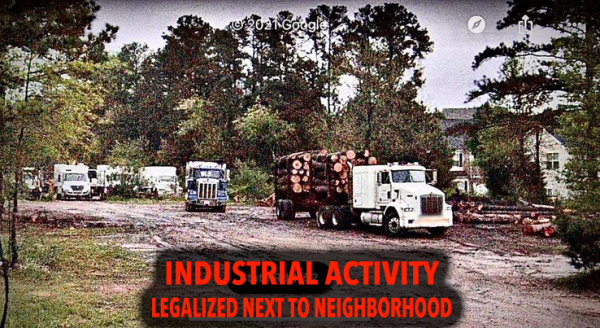Trisha Posey was shocked when Councilor Nicole Stewart justified continuing and legalizing a noxious industrial activity next to her neighborhood. Tryon Woods HOA President Trisha Posey shared her letter to Council with Livable Raleigh:
Dear Ms. Stewart,
I watched this afternoon‘s presentation on the zoning case Z-49-20 and must admit my shock when I heard you speak in favor of the rezoning. I am beside myself that preference to a business that operated illegally to the detriment of human lives is the choice five out of eight council members supported. I would have appreciated you reaching back out to me to share your position had changed after we spoke on this matter, and you appeared to give community support.
The daily use of the fleet of industrial trucks will dump toxic fumes into our communities and create noise and light pollution that the site proposal buffer will not mitigate. This property has been left contaminated for nearly 20 years. Despite this, the greater public interest remains the residents living in our urban communities will be affected by the business’s daily operations of the fleet of industrial trucks.
I was transparent about this when we spoke, and I shared how the fumes affected my health and the health of neighboring residents. I spent my first year living here undergoing care with my ENT and was referred to a Pulmonary doctor to get my asthma under control after being exposed daily to the toxic fumes from the fleet of trucks. I shared with you that I experienced asthma attacks when I walked into my backyard from the carbon emissions that filled my backyard from the industrial trucks that entered and exited the vacant property.
How can you defend this harmful toxic emission as just any other commercial business? It’s a FLEET, not one truck.
How can you place the land clean-up left unattended by city officials for nearly 20 years over the immediate safety of human beings living in proximity and exposure to toxic conditions deemed harmful to humans by the CDC and EPA research?
CDC and EPA report’s that we shared on the air, noise, and light pollution are evidence-based. How can you support this business operation over human safety and welfare?
On behalf of my community, I will continue to oppose and even appeal this decision based on the blatant disregard to comply with the city’s comprehensive plan to the detriment of public health.
Inconsistent with the 2030 Comprehensive Plan
Policy LU 1.2—Future Land Use Map and Zoning Consistency
Policy LU 5.4—Density Transitions
Policy LU 5.5—Transitional and Buffer Zone Districts
Policy LU 5.6—Buffering Requirements
Policy LU 8.10—Infill Development
Policy EP 8.4 — Noise and Light Impacts
Policy UD 1.10—Frontage
Policy UD 3.8—Screening of Unsightly Uses
Policy UD 7.3—Design Guidelines
You are tasked with one fundamental obligation as an elected official and that is to protect and serve the interest of the public. This decision demonstrates a lack of human care by Council Members and disregard to uphold city policies. I ask that you reconsider your decision and uphold the city’s comprehensive plan that is designed to serve and protect the greater public interest. Specifically, the diverse urban communities affected by this rezoning.
Trisha Posey, Tryon Place Resident
Cc:
Stormie Forte, District City Council
Mayor and City of Raleigh Council
Tryon Place Board Members
University Woods Board Members
Livable Raleigh
WRALCBS
17News and Observer
https://go.boarddocs.com/nc/raleigh/Board.nsf/goto?open&id=C2GSEQ725CE9
(Environmental Protection Agency, Health Effects of Particulates and Black Carbon, December 2013.)(Centers for Disease Control and Prevention and U.S. Department of Housing and Urban Development 2006).
Livable Raleigh initially reported on this rezoning case in early May.
Despite strong public opposition Z-49-20 (Tryon Road) was approved 5 to 3 (Forte, Cox, Buffkin voted against). Council, led by fake environmentalist Nicole Stewart, decided to legitimize an illegal operation and further harm the environment.
Any of the supporters could have recommended a non-industrial rezoning, or a financially viable and non-disruptive use like the self-storage use on the other side of the dump site from the neighborhood.
District D Councilor Stormie Forte told people that she was “vote trading” with Councilor Buffkin to deny the rezoning, but apparently was ineffective in securing enough votes to deny the rezoning, despite noting that her constituents in District D were opposed to the rezoning. Instead of making a motion to deny, Forte deferred to Mayor Pro Tem Stewart to make a motion to approve.

